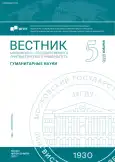German-Language Orthodox Flyer: Linguoculturological and Linguopragmatic Aspects
- Autores: Mileeva O.A.1,2
-
Afiliações:
- Saint Tikhon’s Orthodox University of Humanities
- Moscow State Linguistic University
- Edição: Nº 5(873) (2023)
- Páginas: 68-76
- Seção: Linguistics
- URL: https://journal-vniispk.ru/2542-2197/article/view/351353
- ID: 351353
Citar
Texto integral
Resumo
This article describes the genre of “educational flyer” as part of the German-language Orthodox discourse. The German-language Orthodox flyer is a popular genre in Germany, which is due to sociocultural, linguistic and historical factors. The article highlights and describes the key strategies and tactics peculiar to the German-speaking Orthodox leaflet. The choice of strategies and tactics is determined by the target audience. Some of the strategies and tactics are typical for all target groups, while the other part is used for a narrower audience.
Palavras-chave
Sobre autores
Olga Mileeva
Saint Tikhon’s Orthodox University of Humanities; Moscow State Linguistic University
Autor responsável pela correspondência
Email: mileeva.oa@gmail.com
Lecturer at the Department of Foreign Languages, Faculty of Theology, Saint Tikhon’s Orthodox University of Humanities; External PhD Student at the Department of Grammar and History of the German Language, Faculty of the German Language, Moscow State Linguistic University
RússiaBibliografia
- Karasik, V. I. (2002). Jazykovoj krug: ličnostj, koncepty, diskurs = Language circle: personality, concepts, discourse. Volgograd: Peremena. (In Russ.)
- Plisov, J. V. (2017). Nemeckij religioznyj jazyk v kontexte polikofessionaljnosti: opyt lexikografičeskogo i duskursivnogo opisanija = German religious language in the context of polyconfessional: the experience of lexicographic and discursive description: Senior Doctoral thesis in Philology. Nizhny Novgorod. (In Russ.)
- Bobyreva, J. V. (2007). Religioznyj diskurs: cennosti, žanry, jazykovyje charakteristiki = Religious discourse: values, genres, language characteristics. Volgograd: Peremena. (In Russ.)
- Anisimova, E. E. (2019). Religioznyj diskurs: funkcionaljnyj i antropologičeskij aspekty = Religious discourse: functional and anthropological aspects. Moscow: Moscow State Linguistic University. (In Russ.)
- Anisimova, E. E. (2021). On aspects of studying religious discourse in domestic linguistics. Vestnik of Moscow State Linguistic University. Humanities, 9(851), 71–84. (In Russ.)
- Bugajeva, I. V. (2010). Jazyk pravoslavnoj sfery: sovremennoje sostojanije, tendencii razvitija = The language of the Orthodox sphere: the current state, development trends: Senior Doctoral thesis in Philology. Moscow. (In Russ.)
- Balašova, E. J. (2016). Rolj teleonomnych konceptualjnych polej v organizacii religioznogo diskursa = The role of teleonomic conceptual fields in the organization of religious discourse: Senior Doctoral thesis in Philology. Saratov. (In Russ.)
- Plisov, J. V. (2022). Fenomenologija sovremennogo nemeckojazyčnogo religioznogo diskursa: teolingvističeskij analiz = Phenomenology of modern German-language religious discourse: theolinguistic analysis. Nizhny Novgorod: Nizhny Novgorod State Pedagogical University named after Kozma Minin. (In Russ.)
- Shustova, S. V., Isaeva, E. V. (2019). Migration linguistics: formation and development. In Migration linguistics in the modern scientific paradigm (pp. 5–64). Perm: Perm State National Research University. (In Russ.)
- Zubareva, E. O. (2019). Linguistic representation of the concept of migration. In Migration linguistics in the modern scientific paradigm (pp. 65–112). Perm: Perm State National Research University. (In Russ.)
- Guchman, M. M., Semenjuk, N. N. (1983). Istorija nemeckogo literaturnogo jazyka IX–XV vekov = History of the German literary language of the 9th–15th centuries. Moscow: Nauka. (In Russ.)
- Anisimova, E. E. (1994). Kommunikativno-pragmatičeskije normy nemeckich apelljativnych textov = Communicative and pragmatic norms of German appellative texts : Senior Doctoral thesis in Philology. Moscow. (In Russ.)
Arquivos suplementares










